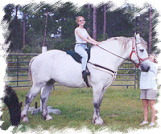Site Menu:
| This is an archived Horseadvice.com Discussion. The parent article and menus are available on the navigation menu below: |
| HorseAdvice.com » Diseases of Horses » Endocrine System » Hypothyroidism in Adult Equines » |
| Discussion on The myth of the cresty neck. | |
| Author | Message |
|
Posted on Tuesday, Jul 10, 2001 - 6:44 pm: Dear Dr. O.,Someone at the barn where I board has, through well-meaning intention, suggested I get my horse checked for a thyroid problem. She referred to his being such an easy keeper and the fact that he has a 'cresty' neck. So, I checked on your site to read up on this. I believe she is acting on the incorrect association of hypothyroidism with overweight, cresty horses with a tendency to founder - as you have outlined in your article. I have printed out your article to share with her. In my particular case my horse is a very easy keeper, and I am working on reducing his weight. He gets no grain, but is on pasture overnight. He gets some hay during the day when he is in. He is worked 5 to 6 days a week - 1 hr, moderate exercise. He is 11, and has no history of founder. He is bright, alert, has energy, good coat and good feet (barefoot), and of course a ravenous appetite. I expect that as the pasture dries up, he will slowly lose weight through the fall and winter. However, I am still curious about the confirmation issue regarding his neck. He is an App crossed with a Belgian Draft. I have seen Belgian drafts locally, as many of the Amish farmers use them for work horses. My horse has their build: round rump, short-coupled body, short thick neck. I think I have seen this neck confirmation referred to as a 'bull neck'. For my own information, I am trying to figure out how to differentiate between a cresty neck and a normal neck on a draft horse. As my horse loses weight slowly over the next 6 months, should I see a change in his neck? To tell you the truth, I think his neck has always looked that way, even when he was thinner. Do you have any guidelines to share? Thanks, Mary PS - I think this post probably belongs under a 'confirmation' topic - but I didn't see one. Did I overlook it? |
|
|
Posted on Wednesday, Jul 11, 2001 - 3:11 pm: Hi Mary, excellent question. I too am curious what is normal for a draft horse or cross and how can you tell.I just bought the below Percheron and she looks a bit cresty to me but I don't know if this is just normal. ~Barbara 
|
|
|
Posted on Wednesday, Jul 11, 2001 - 3:37 pm: Mary,I have a horse with cushings and a true thyroid condition. He has a cresty neck. I was fortunate that I have owned this horse since he was foaled and knew his body well throughout his life and watched the cresty neck develop. I also have an appaloosa who is short, stocky and he has a short thick neck. You should find out if this is the way this horse's neck has always been. Of course, if you think he has a medical problem, just get his blood tested. You wouldn't want to wind up with a cushinoid horse and not treat it properly. Hope this helps, a little anyway. Stacey |
|
|
Posted on Wednesday, Jul 11, 2001 - 11:24 pm: Yeah, that's so true. Some horses naturally have a cresty neck, and some don't unless something is wrong - or they're grossly over weight. I believe one way to tell is the "feel" of the crest. The abnormal crest is usually hard and sort of lumpy feeling, while the natural crest is softer and feels more "normal" At least this is the case with my two. DJ, the Morgan, is naturally a bit more cresty than some other breeds. But, my QH/pony mare gets cresty when she is over weight. He crest is the hard, lumpy kind. She is very prone to grass founder and I have to tightly restrict her grazing in the spring/early summer. DJ, on the other hand, never has this problem.Suzy |
|
|
Posted on Thursday, Jul 12, 2001 - 7:03 am: I think most miss the point of a cresty neck, though Susan points it out. The cresty neck is not the problem and from a scientific or medical point of view we are not able to associate the neck alone with any disease processes at this time. There is no proof a cresty neck is associated with hypothyroidism for instance.The point of a cresty neck is that it is an indication of obesity. Obesity is associated with founder and fatty liver disease. As some of you point out there are breeds that seem to be natuarally cresty. If you have one of these you should be looking at the horses overall condition (see: Care for Horses: Disease Prevention and Health Care: Weight, Condition, and Eventual Height Estimation) to determine obesity as the neck may be somewhat misleading. DrO |
|
Horseadvice.com
is The Horseman's Advisor
Helping Thousands of Equestrians, Farriers, and Veterinarians Every Day
All rights reserved, © 1997 -
is The Horseman's Advisor
Helping Thousands of Equestrians, Farriers, and Veterinarians Every Day
All rights reserved, © 1997 -
